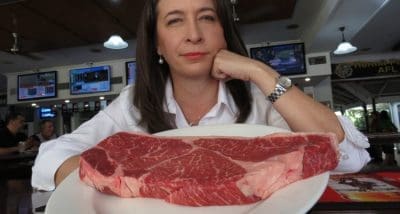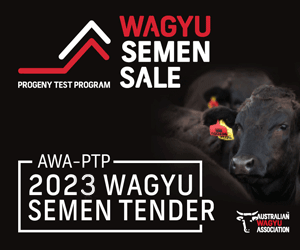A few months before last year’s Federal election, Coalition and ALP senators sitting on the rural and regional affairs committee jointly released and supported recommendations to prevent food products made with plants from being sold under descriptors such as beef, chicken or pork.

Senator Susan McDonald who chaired the Senate Rural and Regional Affairs committee inquiry into meat labelling.
The report, headlined Don’t mince words: definitions of meat and other animal products, also urged regulatory bodies to realign meat definitions in the domestic market with how they are used in export markets.
The inquiry also recommended the ACCC and consumer law ensure that packaging is not misleading, with wording to appear on the front of packaging and not the back, with appropriate sized fonts to be used in descriptions.
Almost a year and a half on, and despite the bi-partisan Parliamentary support for the inquiry report, progress toward enacting its recommendations has been very slow, committee chair and LNP senator for Queensland, Susan McDonald, told Kerry Lonergan in an interview for The Weekly Grill podcast, which aired on Friday.
Plants still being sold as ‘beef’ on menus
While Canberra’s political machinery has been slow to enact the recommended changes, Senator McDonald noted with frustration that plant-based product continues to appear under misleading beef descriptors in Australia’s capital, as it does right across the country.
“I was at a bar in Canberra the other day, and looking at the menu and I suddenly realised that there were ‘beef’ patties and all these products and none of them were actually meat, they were all plant protein.
“There was nowhere that really clearly said that, so how do we get those descriptors that translate all the way through onto a menu?
“…So it’s not just packaging in supermarkets, it’s right down to the restaurant level.”
Progress, maybe
Senator McDonald said the change of Government soon after the inqury report was handed down last year meant much of the momentum to drive the recommendations forward had slowed.
 However there were some signs of positive progress ahead.
However there were some signs of positive progress ahead.
“I did speak to the agricultural minister (Senator Murray Watt) the other day, (and) he said that he thought I’d be pleased with the outcome so I’m optimistic that during this term there might be some progress made, but I continue to raise that with FSANZ (Food Standards Australia New Zealand) at Estimates and continue asking questions.
“This is an important topic that we have to get solved before we have a whole lot of these groups spend a lot of money on packaging and manufacturing and then we tell them they’re going to have to scrap it.
“That’s a big business cost and I would like to see it managed with more transparency and greater lead time if possible.”
Other countries enact recommendations
Interestingly, while the Australian Government remains slow to enact the outcomes of its own inquiry, Senator McDonald said legislative changes had been made in other parts of the world, as a result of the Australian inquiry.
“I know that there were places in the US reflecting on Australia’s definitions inquiry in the seafood industry, in the meat industry, and of course you’ve already talked about in Europe where they have clarified that leather must be the product of an animal.
“These are important definitions, if only to protect consumers from buying something that they didn’t think they were buying.”
Senator McDonald said consumer protection law is about describing things in a way that consumers find easy and understandable, and labelling using meat descriptors to sell products made with plants was “a clear example of that being abused”.
“It is unreasonable that you can put beef, crocodile, lamb, pork, on a product where it is clearly not made from any of those meats.”
‘Their objectives are not compatible with co-sharing space with animal protein’
Numerous representatives of plant-based groups told the inquiry that their products represented no threat to actual meat products, caused no confusion to consumers, gave customers choice, and were essential to help solve a looming protein shortage as the global population grows.
Senator McDonald said that as the senate committee inquiry delved further into the issue, she was alarmed to find the extent to which some plant-based groups were motivated by putting an end to all meat consumption.
“I was really concerned by the way that you could have a peak industry body established for the plant-based protein industry, which, when we dug a little deeper and we read their constitution, we found that one of their three stated aims was to end animal production,” she said.
“So, you know, we have to be really clear that whilst they were very professional, and remain very professional and organised and slick, their objectives are not compatible with co-sharing space with animal production or animal protein and we have to be clear about that.
“I was pretty shaken by that, to discover just how deep the desire to end animal production, and this is right across- not just red meat – this is all sorts of food.
“And also, this weird misbelief that you could replace animal production, particularly in Australia, which has unique conditions, with vegetable crops, you could have rangeland animal production there replaced by mushrooms and broccoli and whatever else.
“So, it was a little disheartening to again discover the depths of misunderstanding between the consumer and reality.”
Senator McDonald said she was not as concerned about non-meat products being sold with descriptors such as mince, sausage or steak, because these terms had been used interchangeably for many years – offering mince pies as an example, which could describe meat or fruit based products.
“I think the key is we can’t use beef or fillet or roast duck, they’re all obviously terms that relate to a product that plant-based protein isn’t.”
Supermarkets unlikely to challenge manufactured food companies
She also expressed frustration at the large supermarkets, which she said would not come and give evidence: “I wanted to ask them, what were their mark downs? What were their margins? Why were they placing these products so close together on shelves?
“I think we have to be clear, supermarkets make their money, apart from the meat section, in those centre isles where they get margins from manufactured food.
“This is just another element of that and I think it’s very difficult for supermarkets to say to their big manufacturing customers, who make their high margin products, ‘no we’re not going to stop this lie’,
“They are a commercial beast and that’s fine, so long as they’re not confusing their customers and they’re not selling out their long term supplier base from animal protein products.”
For more on the meat definition issue and other topics including how proposed new rules for pharmacies are set to heavily impact rural and regional Australia and the need for greater action on the live export compensation claim , click here to listen to the full The Weekly Grill podcast interview (25 mins)
